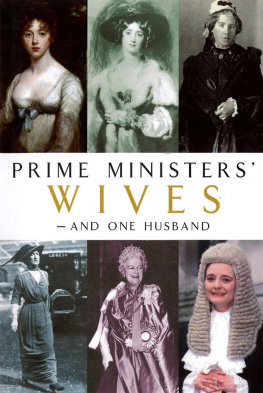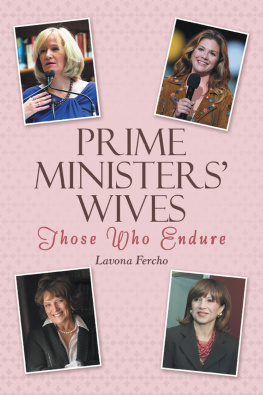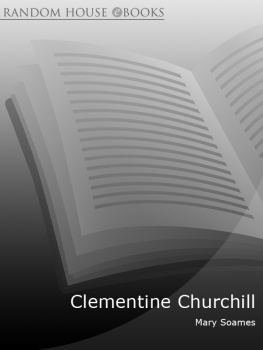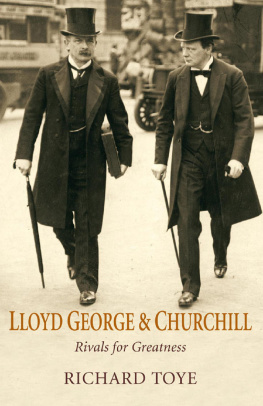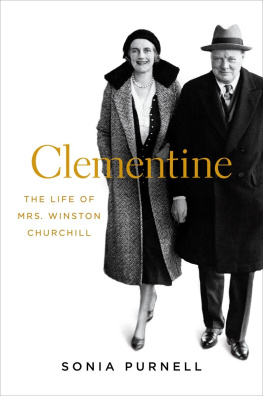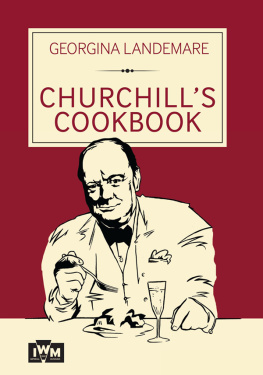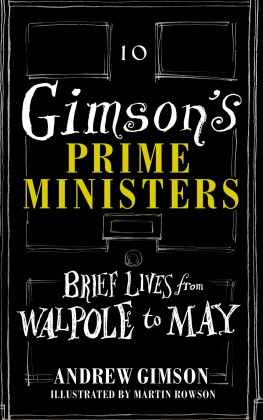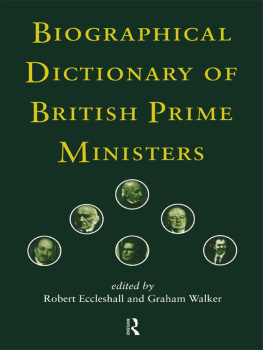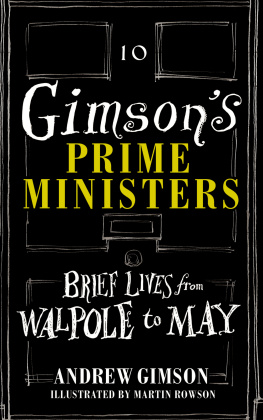PRAISE FOR PRIME MINISTERS WIVES AND ONE HUSBAND
Hichenss narrative is fresh he writes with clarity, pace, wisdom and wry humour. Spectator
PRIME MINISTERS WIVES AND ONE HUSBAND
Over the centuries, the wives of British prime ministers have come from a variety of backgrounds. Much has been required of them: they need to be gracious hostesses, practical managers, sound advisers and sympathetic listeners. Nearly all have served their husbands well, toiling behind the scenes with little recognition. When the glare of publicity has swung round to them it has all too often been of the wrong sort, even when, like barrister Cherie Blair, they are high-flyers in their own right.
In this book Mark Hichens provides vivid portraits of these wives, assessing their roles and achievements and the aspects of their characters that have made some of them so memorable. Caroline Lamb, for instance, would dress up as a pageboy and had herself borne naked into the dining-room on a silver salver. Catherine Gladstone regularly had to cope with the ladies of the night brought home by her husband for redemption. Margot Asquith, who had a relationship with the poet Tennyson before her marriage, was known for her wit, once referring to a US general as an imitation rough diamond; while Clementine Churchill gained respect during the Second World War by supporting bombed-out families in the East End of London. Lady Palmerston proved to be an effective diplomat, exerting considerable influence on affairs of state at receptions and other gatherings, while some spouses, such as Denis Thatcher, appear to have regarded public appearances as fraught with embarrassing possibilities and preferred to remain in the background. In recent times prime ministers consorts have taken refuge from the stresses of Downing Street in various ways Mary Wilson through poetry, Denis through golf and Norma Major through charitable works and biography.
In terms of their marriages, some have been secure, some wobbly and one broke down altogether. This book considers the changing nature of the role. Is it right in the modern world to expect a prime ministers wife to live in the shadow of her husband?
Mark Hichens brings all the spouses both the celebrated and the obscure into the spotlight, by examining their personalities and lives as well as the roles they have played on the British political stage.
MARK HICHENS is a biographer, historian and retired teacher. His publications include several history books and Oscar Wildes Last Chance: The Dreyfus Connection and Wives of the Kings of England: From Hanover to Windsor (also published by Peter Owen).
ACKNOWLEDGEMENTS
I have had generous help in writing this book. Shelagh Montague-Browne was kind enough to read through the chapter on Clementine Churchill and made some valuable suggestions; and the late John Grigg went through with great care the part on Margaret Lloyd George and made a number of helpful and apposite comments. I am especially indebted to Anne Armitage (de Courcy) for extensive guidance and encouragement. The book has been much improved and facilitated by her assistance.
CONTENTS
ILLUSTRATIONS
Plates appear between
INTRODUCTION
G reat Britain has been well served by the wives of her Prime Ministers. Nearly all have been loyal, conscientious and discreet. With a few exceptions their marriages have been soundly based, and there have been no divorces although Dorothy Macmillan pleaded with her husband for one and David Lloyd George gave his wife ample grounds for separation. There has been one legal separation between Caroline and William Lamb (later Lord Melbourne), and for most of their married lives Robert and Catherine Walpole lived apart as did the Duke and Duchess of Wellington. Moreover, relations between Henry and Margot Asquith were not always on an even keel. Otherwise, with the usual ups and downs, the marriages have been loving and lasting.
It might have been expected that among the forty or so spouses there would have been a few who would have been power-hungry and unscrupulous and sought to be the power behind the throne, but this has not been the case. There have been no Marie Antoinettes or Tsarina Alexandras breathing pernicious advice into their husbands ears. Of course some wives have been powerful and influential: Emily Palmerston was certainly the most powerful woman in the country in her day and so, some believed, was Lucy Baldwin. But their power was exercised benignly on behalf of their husbands or their charitable causes and not themselves. The majority of the wives have not been politically minded and have been content to remain in the background, managing their homes, caring for their families and providing for their husbands a calm and happy domestic base where they could relax and do the things they enjoyed most. It was perhaps the most important quality in a wife that she should be a good listener, as the great need of politicians is for someone to whom they can pour out their concerns and in whom they can confide with complete trust. No great political sophistication is required of them, but they should at least be be attentive and ready with down-to-earth advice and, in particular, be good judges of peoples character; in this some have been more shrewd than their husbands.
Not many Prime Ministers wives have felt themselves capable of speaking out candidly when they thought their husbands might be acting unwisely. Of course in public they must back their spouses up and stand squarely behind them, but in private there are times when the best service a politicians wife can render is some plain speaking. This was Clementine Churchills great strength, notably in 1940 when Winstons popularity and prestige were at their height and she wrote him an outspoken letter saying, in effect, that power was going to his head. Years later Denis Thatcher, too, was ready to speak frankly. Usually he kept out of politics, but at carefully judged moments he would intervene to calm his wife and introduce a note of reality or, in his own words, to tell her what the hell was going on.
A thorny problem for wives has been coping with the media. Journalists will always seek them out for their views on every sort of topic as well as titbits of information on their private lives. Any communication is dangerous: all too often their lightest word will be distorted and taken out of context and they suddenly find themselves in the midst of controversy. Because of this most have found it the safest course to give no interviews at all, even to the friendliest correspondent. But they cannot escape that easily. Journalists are constantly on the look-out for the least indiscretion or slip of the tongue, and they have to be humoured and treated with courtesy, whatever the provocation. In the twentieth century it has been the aim of nearly every consort Margot Asquith being the main exception to keep out of the limelight and say as little as possible, and in this, on the whole, they have been successful. But of course there is nothing they can do when the satirists decide to make them the butt of their jokes, as Private Eye did so successfully with Mary Wilson and Denis Thatcher. All they can do then is to go along with it and seem to enjoy the fun.
The wives have come from different backgrounds: some, but not many, from the aristocracy Dorothy Macmillan, Catherine Gladstone, Caroline Lamb but most from business and professional families. It is notable that of the last two aristocrats to be Prime Minister, Lord Salisbury and Lord Rosebery, the former married the daughter of a judge and the latter the daughter of a banker. It is likely, therefore, that the wives would have been very different from one another in their personalities, interests and lifestyles. A few have been keen political activists, ready to play their parts behind the scenes, drawing people out, soothing ruffled feelings and building bridges. In this Emily Palmerston was supreme, but Margot Asquith in her idiosyncratic way and Hannah Rosebery less conspicuously were no mean performers. Others were essentially homebodies and did the minimum of political entertaining but undertook extensive charitable works (notably Catherine Gladstone, Lucy Baldwin and Norma Major). Apart from Audrey Callaghan and Cherie Blair none had had careers of their own. Most were domestically minded, although only Mary Anne Disraeli considered that her sole task was to see to the comfort and well-being of her husband.

